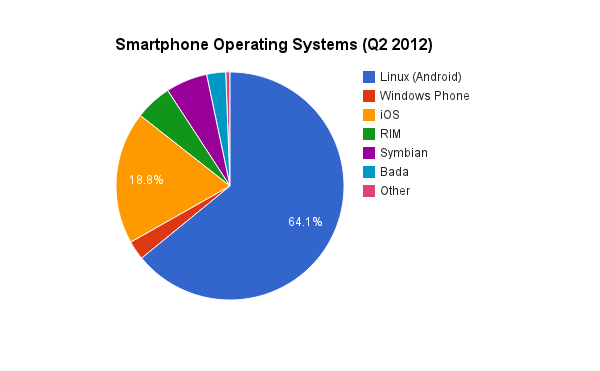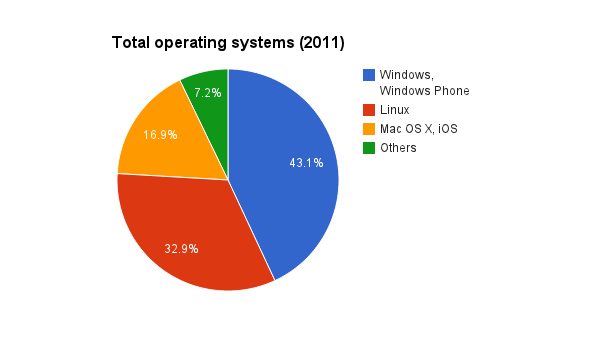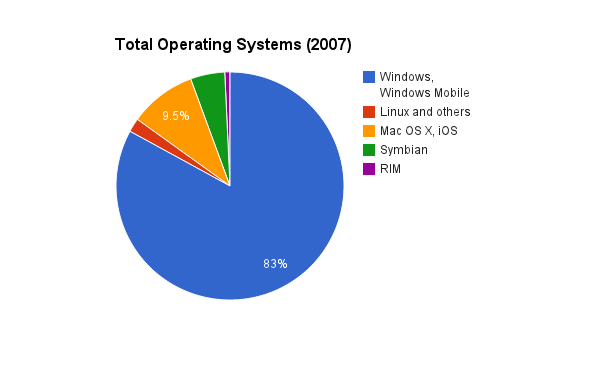Editorial: Will 2013 be the year of… Microsoft?

For many years the consensus among “experts” (journalists) has been that Linux wouldn’t ever reach the consumer market, nor would Apple. Recently on a famous and entertaining (yet technically deprived) show On The Verge from the american website known as The Verge, Mary Jo Foley laughed at the idea that Linux could ever be relevant. This is a form of delusion, as I pretend to show in this editorial: The year of Linux has already happened, while its now Microsoft the one crawling to get its own.
Surely many readers would dismiss such an assertion based on Microsoft’s share of the PC market, but that’s a misleading statistic, while it’s true that back in the day the consumer electronics (among computational devices) market was the PC that’s not longer the case. Moreover, by itself, it fails to show any market trends.
Fact checking
The share of the consumer electronic space in 2011 already has PCs as a minority. I’m omitted MP3 players and other minor categories, because their share is too small and is going down.
Note that not all phones are smartphones, only around 36.7% of phones are. And since non-smartphones will continue to go down and smartphones to go up (in fact, in countries like the United States smartphones have already surpassed 50%), the share of PCs will keep shrinking.
Tablets sales are also going up, for year 2012 an increase of almost a 100% in sales is expected, and it’s not like tablets didn’t sell in 2011, companies sold over 60 million, in other words, there were as many tablets sold in 2011 as Sony has sold PS3s in 6 years.
So what’s the OS distribution in smartphones?
One thing to note about this pie chart is the fact that Bada, a proprietary operating system developed by Samsung, which you have probably never heard of, outsells Microsoft’s Windows Phone.
What about tablets?
Wait. Where’s Windows? Well, it’s actual share of the sales is so low it doesn’t make sense to include separately, so it’s down there, with others .
Why is all this so important? Let’s see the real market share of operating systems across all pertinent consumer electronic devices (PCs + Tablets + Smartphones) as of 2011:
As you can see Microsoft has deep well under 50%, and that red piece is Linux, so much for Mary Jo Foley’s comments. Even more important is how different things were just a few clock cycles away:
So naturally Microsoft is a little bit scared by this development. Analysts expect smartphone sales to go up all the way to 1.6 billions by 2016, tablets are expected to go up to 450 million and PCs are expected to hit around 550 million. Simple arithmetic shows that unless Microsoft manages to make a dent in the smartphone and tablet market, it’s pretty much the end of its dominance (in the following chart, I’m assuming the same market shares as today, which is unlikely, given how fast Symbian, RIM, and other are falling, and the fact that Microsoft is trying to do something, in other words, the following chart doesn’t constitute a forecast, it’s just a conditional situation):
So those are the facts. Linux already had its year, or rather years. On the other hand, the one that needs to have a year is Microsoft, or it will slowly decade into irrelevancy, bare in mind that I’m not talking about a distant future, 2016 is just 4 years away. But why is Linux succeeding in taking a prominent space in smartphones and tablets and failed in the desktop?
How Microsoft managed to monopolize the PC industry
In one acronym: OEMs, i.e. Original Equipment Manufacturer(s). While Microsoft did offer some interesting pieces of software, it basely achieved market saturation not by making consumers choose its operating system over other alternatives, but rather by making OEMs choose their operating system as the default operating system.
I’m not arguing PCs should come with an empty hard drive and people should install an operating system afterwards, that would be an incredibly bad experience for regular consumers, and the first to do otherwise would end up crushing the competition, as it’s been stated many times in recent history: It’s the software, stupid.
Anyway, Microsoft managed to convince OEMs to sign their dead sentence, as we just stated, it’s all about the software, and if Microsoft singly handily controls the OS, it controls the OEMs and the profits. The current business model of the PC industry is profitable for Microsoft, but it makes no sense whatsoever for OEMs.
Why don’t OEMs abandon Windows? Because most of the software people is used to, and most of the software people expect to find, is only available for Windows. Say you’re the rogue OEM that decides to ditch Windows, when a regular consumer comes to the store and sees this weird laptop running an OS he has never seen, moves the cursor around looking for Microsoft Word just to find it isn’t there, or worse yet, buys it, and finds no way to install his favorite game or application, then it’s all over for this OEM. It’s either all of them at the same time, or none of them.
In fact, OEMs have regularly try to find ways to escape Windows, Netbooks for example, were sold using Linux out of the box, why did they think they could manage this? Simple enough: They just needed to sell this Netbooks as if they were not a PC in the regular sense, but as if they were a new kind of device, therefore, changing the expectations and the requirements. And this is just one example, MeeGO had a similar goal, but sadly it died (something I still consider a catastrophe).
Oh, but OEMs won’t fall for the same trick twice. Only Nokia did, and that’s only because they didn’t sell PCs (it made like 2 netbooks, but nothing noteworthy), by committing itself to Windows Phone exclusively, and I think it will pay the price of not learning from the past.
However, you may be thinking OEMs just changed their boss, so to speak, in the past it was Microsoft, now it’s Google. But you would be terribly wrong, practically all of them sell devices running other operating systems, and, more importantly, Google’s Android is Open Source, so OEMs do as much as they can to sell their experience not Google’s. For example, the Galaxy Note II is a Samsung device made possible by Samsung’s own hardware and software modifying and running on top of Android, whomever is buying this kind of devices is buying Samsung’s user experience.
How Microsoft is trying to fight this new development
Microsoft has two different strategies:
1. Sue as much as possible to increase the costs of using Android or any form of Linux to OEMs. Effectively bullying them into using their OS.
2. Making Windows Phone and Windows 8 competitive in the tablet and smartphone market.
Is Microsoft succeeding? Kind of. Windows 8 is, in my opinion, a deeply flawed experience, but it will undoubtedly have some impact, though not much in my opinion, Windows Phone is a decent experience, but it’s still subpar compared to Android and iOS. Its bullying, on the other hand, is definitively working, for example, HTC pays Microsoft a fee (Microsoft makes more money from Android fees than Windows Phone itself), in order to get a lower fee, HTC accepted to invest more on Windows Phone, in my opinion, this kind of behavior is completely anti-competitive, and it should be illegal. I don’t usually agree with Richard Stallman, but he gave a great speech regarding software patents.
Can other Linux distributions make a dent in the market?
I think so. Among advanced users alternative operating systems or distributions will always be popular, just like CyanogenMod, among others, is popular with buyers of Android smartphones.
Microsoft and its partners will start selling tablets with Windows 8 soon, therefore, expanding the possibilities of switching operating systems on PCs with touch screens. What Microsoft is trying to achieve with Windows 8 is not just competing in tablets, that wouldn’t make much sense for them, as they’re clearly behind in everything, what Microsoft is trying to do is bring their desktop alongside their tablet experience so they can try to force their old, nobody cares in the tablet space and build in monopolistic ways, advantages into this new market.
As this new wave of PCs with touchscreens become relatively popular, Linux distributions can push themselves into the market, as most users simply don’t care about the old windows experience when they’re using their tablet, they don’t expect Microsoft Office in the regular sense, nor they expect anything in particular. And it opens the possibility of some OEMs going with Linux as their tablet operating system, and I just don’t mean Android.
Possibilities
Imagine the possibilities for a second: Netrunner could make use of KDE’s new layout, Homerun, to be the homescreen, since Plasma was designed with vector images in mind, it can easily adapt its current widgets to the size they need to be usable with the rather low precision of our fingers.
Likewise, KDE was designed with modularity in mind, so there’s no need to rewrite any service, we just need to design interfaces usable with finger input. Telepathy, Phonon, KWin, KParts, Akonadi, NEPOMUK, Plasma, all can be reused.
In fact, given how flexible KDE is, many interesting things could be done. For example, we could trigger a simple change in the interface when a mouse is plugged in, getting you into the KDE we know and love, unplug it, and it could switch back to a touch optimized version of KDE.
Moreover, Netrunner offers key features that would make for a terrific experience, since all the underlining services would be the same, and since Netrunner already offers its users an extremely easy way to setup web accounts, you could just add your Google Account or Facebook Account and all information would be the same in both this possible tablet mode and the desktop mode. Not only your email will be in perfect synchrony, but even your offline drafts and similar things could be completely in sync.
And it’s not just day dreaming, KDE has started developing its tablet interfaces since MeeGO died, but that’s another story, for another article. I think the following years will be an exciting journey for Linux, as well as an opportunity to continue it’s rampant march towards world domination. And Microsoft, well, one has to wonder if 2013 will be its year, after all, 2010, 2011, and 2012 were all supposed to be its year.








I hope Netrunner will continue to provide a good desktop environment as well though. The reason I left behind Gnome and Ubuntu after so many years is because they try to force a phone/tablet environment on desktop PCs too. Please don’t let KDE and Netrunner go the same way.
Of course. I never intended to suggest Netrunner would abandon the desktop paradigm, I only suggested it could seamlessly switch between a tablet mode when being used with finger input, and desktop when used with a mouse.
netrunner is the best gui by far that i have found and I have tried many, ubuntu is cool but as far as I can see Netrunner offers a more complete and user efective gui and does not make the user feel presured in to some almost there os. Please keep Netrunner moveing forward and as cool as it is. I have finaly found a gui that turned my attention and support away from MINT wich is also very cool. Linux will be the wave of the future as long as it competes the same way as it has from the beggining by staying true to its begginers and power users. Fast Powerful Compact and Smooth.
interesting article. but would you mind giving the source of your data??